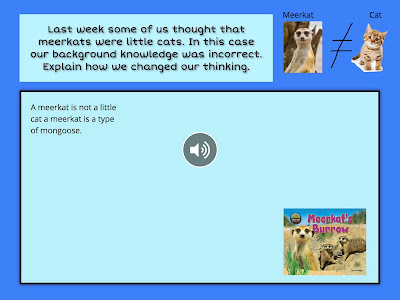This book was really neat as an informational book for students to get a basic understanding of meerkat's life, behavior, and habitat. During phase 1 (literal, general understanding & key details) one of my students announced that he thought a meerkat was a "little cat." As a class, we investigated this claim. Turns out, meerkats are actually a type of mongoose, not a cat at all. We learned that good researchers follow through on their thinking to find information that either confirms or disconfirms their beliefs. Sometimes, good readers have to change their thinking based on new information. Here's a thoughtful log example of this learning:
In hunting for this book on meerkats, I came across another meerkat book which was perfect for phase 3 (purpose, meaning, connections). For phase 3, I read Meet the Meerkat by Darrin Lunde. What struck me as interesting about this book is that it presents factual information on meerkats, but in a narrative, question-answer style. The meerkat is actually doing the talking as it is being asked questions. In language workshop, we compared Meerkat's Burrow and Meet the Meerkat. We discussed whose voice we hear.
Talking about the voice we hear was a nice bridge into our mini-lesson in reading workshop where I introduced the term "narrator." In Meet the Meerkat, the meerkat is the narrator. Remember, during language workshop, the teacher reads the mentor text and
scaffolds understanding through discussions, purposeful talk, and thoughtful
log entries. Language workshop is really the "inquiry" or exploratory
aspect of learning reading strategies, skills, and techniques. This is where we discussed similarities and differences between these texts on meerkats, especially in whose voice is doing the "talking."
During reading
workshop, the teacher presents a mini-lesson that defines or labels the skill
or strategy that was explored in language workshop. This lesson is truly
"mini" in that the bulk of reading workshop is for guided reading,
small groups, and independent work. For this lesson, I introduced the term, "narrator." I also made a connection to a text read previously that had a clear narrator to illustrate how a reader can apply the skill.
Here are some thoughtful log entires:







Are you still implementing CLM in your school district?
ReplyDelete